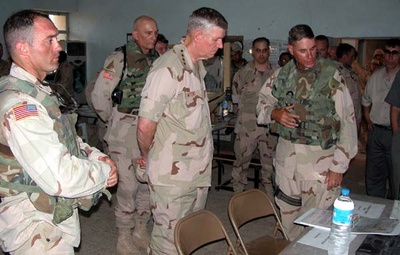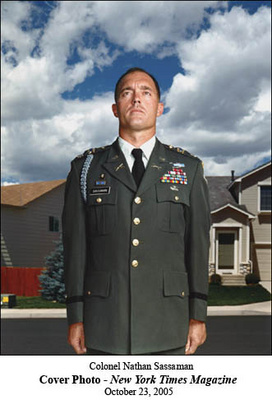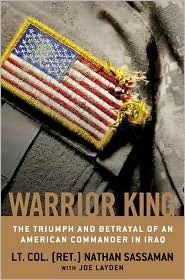Warrior King: The Triumph and Betrayal of an American Commander in Iraq
by Robert Hanafin
I usually do not get into book reviews, because I rarely read books anymore in the cyber-age. However, after getting this review from Aaron Davis the Vietnam Veterans Against the War (VVAW) contact in Utah, a former Army Reserve Major who is still a pain in the butt of the military-industrial complex and every politician regardless of party that support and profits from it, I was inspired to get and begin reading Warrior King: The Triumph and Betrayal of an American Commander in Iraq By Nathan Sassaman, Lieutenant Colonel, USA-Retired.
I put a link to various Google sources as my Source URL, because I consulted a few diverse sources on this book that both puzzled me and make me curious to find out more.
For me personally, I may be mistaken but very few Field Grade Officers question let alone criticize or analyze the war they are fighting in. The few officers who have question the morality or even value of what they have done or are doing have been Company Grade officers, the Lieutenants and Captain, most of them from the National Guard. That said any officer who had the brains to question what’s going on has several things in common (1) depending on how many months, years, days one has until retirement military officers are not allowed by-law to question what incompetent civilian leaders decide. Most, and that includes me, admittedly prefer to wait until getting their military retirement pay and benefits sitting in relatively invulnerability from retaliation by the Military-Industrial Comples they one day realize they are serving NOT the ideal of the American people, or even our constitution. For that we are not only not trusted or cautiously trusted across the political spectrum, if we one day find the Courage to Resist and Speak Out.
I’m going to do very little commentary on what Colonel Sassaman has to say nor make any valued judgement because he is not an enlisted grunt. Ken Burns said it better than I ever could, “Generals and Politicians write about the Glory and Thrills of War when they never have seen combat up-close and personal, it’s the Privates and Sergeants that know the intimacy of combat and war not the senior officers.” Burns was writing about the American Civil War, but the bias about questioning combat, war, and peace being only the realm of the foot soldier is still an attitude held by most Veterans, especially those who have been in combat.
To them I say that for better or worse, the generations of military officers born after Vietnam, in an All Volunteer Force, where leadership had to be by example, inspiration, and persuasion as opposed to leadership by FEAR and Authority only. Why? Despite what is said about leading High School graduates with only a HS diploma, and they are getting fewer in number in our ground forces, the generation of enlisted men and NCOs that I grew up with were not only on a par more educated and brighter than those who went before, (even those without a HS diploma) and I do not mean this as a criticism but an observation. One gigantic difference I experienced from being a Vietnam War Sergeant to a Gulf War Major was that those under you asked questions, troops actually questioned what commanders wanted them to do. Mind you, troops rarely, if ever, disobeyed, but the notion of questioning what one was told in a regimented unit. How many Vietnam Era Veterans would agree with with WAS UNHEARD OF during that war or before.
Robert L. Hanafin
Major, U.S. Air Force-Retired
Vietnam Veterans Against the War (VVAW)-Ohio
Military Families Speak Out-Ohio
Life Member, Disabled Veterans of America
Life Member, Vietnam Veterans of America
Writing Staff, VT Network
BUY ON AMAZON.COM: Warrior King: The Triumph and Betrayal of an American Commander in Iraq
BOOK REVIEW:
Warrior King: The Triumph and Betrayal of an American Commander in Iraq
by Aaron Davis/commentary by Major Robert L. Hanafin, USAF-Retired.
In this book Nate Sassaman writes, “Bring the soldiers home-now. Today… I don’t care how many Generals, Colonels, Captains-whatever-think they can win the war. You know why? I thought I could win the war, too. But there is no war right now (2007/2008). It’s law enforcement.”
 Before you jump to conclusions FOR or AGAINST the war, pick up a copy of Warrior King and follow young Army officer Nate Sassaman’s career from quarterbacking the West Point football team to an 8-3-1 record and Cherry Bowl victory over Michigan State in 1984, until he was seen as a battalion commander in Iraq featured on CNN report by Nick Robertson in 2003.
Before you jump to conclusions FOR or AGAINST the war, pick up a copy of Warrior King and follow young Army officer Nate Sassaman’s career from quarterbacking the West Point football team to an 8-3-1 record and Cherry Bowl victory over Michigan State in 1984, until he was seen as a battalion commander in Iraq featured on CNN report by Nick Robertson in 2003.
LtCol. Nate Sassaman briefing General Tommy Franks
(Photo: DODLink Photos for public release)
Warrior King is the story of a young man from Oregon who attends West Point and believes in Duty, Honor, Country throughout his military career. His story is from a soldier’s point of view that I believe is shared by quite a few of those who served under him though they too will not speak out until the time they are no longer vulnerable to retaliation from the Pentagon and Politicians.
Colonel Sassaman has written a frank and sobering look into his career, leadership, Iraq occupation, corruption, frustrations, the UCMJ and his own PTSD. (Yes, senior officers are finally admitting not only the existence of PTSD but that they are human thus as vulnerable to it as any Private, even if that means waiting until retirement to come out of the closet so to speak. I personally believe that at least one Flag Officer has committed suicide rather than admit he has a Mental Illness but that’s another story and assumption on my part, not investigated fact, thus I mention no name.
West Point: “The academy courts and attracts type A personalities-overachievers driven to lead and succeed…most cadets shared a common trait; it was an almost pathological fear of failure.”
That of course comes from a cadet who was on the football team, in fact quarterbacked the team, usually a Team Captains position, but his observations apply across our military academies and it no longer limited to Type A males.
Training: “There are inherent challenges leading eighteen-year old troops with no more than a high school education into combat.”
With the exception of a hand-full of Civil Affairs troops, “they have not been trained to win hearts and minds.”
Think about it, our troops are no more prepared to win hearts and minds than they would be able to do so in America performing the same Law Enforcement Role they are in Iraq and soon to be escalated in Afghanistan.
“We instill in these men the desire to kill the enemy. We expect them to be machines, but they aren’t. They are human beings. In Iraq the blanket term was ‘Hadji.’ It does lead one to dehumanize the opponent…there is a devaluing of human life. [This] is what makes killing someone a little bit easier in the short run.”
This is a throwback to the Vietnam Era phrase Gook to dehumanize the enemy, think about the implications of this regardless if its Viet Nam, Iraq, or Afghanistan, especially when one cannot tell the difference between friend and foe. 
Leadership: “Had my career not involved combat duty…I might not have been able to play the game…advanced to General officer. Iraq taught me something: I am not made that way. I am a soldier, not a politician. It’s one thing to blindly follow ignorant orders in time of peace it’s quite another when you’re at war…[our ground forces] are getting beaten down-physically, spiritually, and emotionally. The important thing…was not winning or losing…but putting the best face possible on something that is by definition, unpleasant: WAR…there seemed to be no coherent objective. To civilians and Senior Officers alike I used to say you really need to get some American blood [literally] on your hands before you start questioning commanders on the ground and how life should be over there [in Iraq]. Fight your way out of a couple of ambushes, hold the hand of a friend as he/she dies, and then talk to me.”
Politicians: “If you want to become a General Officer, you’d better be a shrewd politician…the administration used the issue of weapons of mass destruction…for public relations purposes. Former Defense Secretary Donald Rumsfeld must accept a significant share of responsibility for what went wrong in Iraq. ….totally ignored the cultural and human endeavors…suggesting we could win a war with cell phones…F-16 rockets…and a handful of special forces troops riding camels and donkeys through the desert...
[This Rumsfeld of Arabia arrogance] …it cost us a lot of American lives…inability to cope with a flood of young, unemployed, disgruntled Iraqi males [many of them Veterans of the Iraqi Armed Forces]. Its just not acceptable…to invade other nations on the premise of eliminating a dictator without…a commitment to putting the nation back on its feet.” [The Colin Powell china shop analogy].
War: “War is imprecise and unpredictable. It is in a word, terrible. There are victims in war sometimes innocent, sometimes not. The line between right and wrong can be blurred to the point of invisibility…a lot of terrible things are going to happen in the course of a war (any war)…the sadness that envelops you as you walk through a farm and see body parts of children…war changes everyone who experiences it…a group of soldiers walking around for the better part of an hour, wearing latex gloves, scooping up body parts…my spirit was broken…I had crossed over to the dark side. I have been, for most of my life an optimist, but Iraq sucked much of that out of me. This is the reality of war, and it is the price of bringing democracy to Iraq.”
Historic precedence was set for this during the American civil war. When it became common knowledge that the civil war was no longer a gentleman’s war, the strategy became taking the war to the civilian population of the South in order to crush their will to fight on and it worked.
Post Traumatic Stress Disorder (PTSD): “I find it hard to believe that anyone who saw combat duty in Iraq can possibly escape the effects of PTSD….no one comes home unscathed…the irritability and anxiousness were unmanageable… I lay awake…replaying events in my head…I fought the war all over again. I’d wake up in sweat. You can only fight the war only so many times in your head, but I couldn’t turn off the noise.”
To those in denial or suppressing it for fear of hurting their military career, I say the personal hell will get worse, that’s why I seriously believe even military senior leadership is beginning to accept the existence of PTSD rather than downplay it as they have since Vietnam. However, the question remains how exactly do senior military leaders intend dealing with PTSD?
Corruption: “On more than one occasion we raided [Iraqi] homes…discovered goods that obviously [had] been stolen from trucks on their way to an American base PX (or BX)…cases of pampers, foot powder, or women’s clothing from Sears or K-Mart…One guy had a closet filled with piles of Jaclyn Smith blouses.”
Black market trade is nothing new to warfare or post-war. The trade flourished in both Germany and Japan after WWII, but it was the South Koreans who perfected it. However, getting goods to the black market during peacetime and war are two very different matters one either has to raid a convoy to get it or it is contraband sold by Support Our Troop contractors.
Speaking of Contractors:
Contract Security: …the contract security experts?…running around in white Chevy Suburbans…dumb as rocks…flying up and down highway one at eighty, ninety miles per hour.”
The mercenary atmosphere of Iraq is most likely the aspect that makes the Occupation of Iraq the biggest difference from any previous war fought including Viet Nam. The increase in commercial armies has made outsourcing war, or law enforcement, a trend of the War on Terror. Because there is no national commitment or vested interest in prosecuting war. Civilian Mercenaries need to either be disbanded, put out of business or under strict control of formal military commanders like Colonel Sassaman.
Uniform Code of Military Justice (UCMJ): “I’ve come to view the [UCMJ] legal system as inherently unfair…you are proven quilty until proven innocent…”
The constitutional rights which you swore an oath to protect for most other Americans are rights forfeited by our troops. Just ask any troops Army or Marine accused of murdering innocent Iraqis or any troops with Courage to Resist as a Conscientious Objectors how fair, balanced, and constitutional the UCMJ has become.
Religious ideology [or idolitry take your pick]:“There is no separation of state and religion in Iraq; its one and the same…[Iraq] will never look like an American or European democracy, and it’s unrealistic to expect otherwise. The fracturing of this country is more deeply rooted in religious difference than anything else…”
Lastly Occupation: “The United States will continue to maintain a large occupation presence (call it a residual force if you want) – a police force…in the Middle East for years, perhaps even decades to come.”
Major Hanafin’s additional commentary: I understand that the best parts of this book, for I haven’t read all of it yet, are that Colonel Sassaman comes across like the late Colonel Hackworth of Vietnam fame, however it remains to be seen if Sassaman becomes a Pro-PEACE activist and advocate who has led an infantry battalion into combat, personally deals with the death of two of his men, and gets an Article 15 in front of his mentor Major General Ray Odierno, who commanded all troops in Iraq.
To give a balanced picture, I’d like to throw out a few negatives quoted about this book, and leave readers to decide for themselves the positives.
“The book has parts that will appeal to a broad cross-section of the public. Hawks will appreciate the call for military toughness; doves will see it as a damning indictment of the war. However, Sassaman has a hard time moving beyond his personal agenda. He rightly deserves our admiration for all he’s accomplished and sacrificed. But at times he comes off as petty, spiteful and slightly contemptuous of those less manly than he is. Regardless, one small piece of the tortured puzzle that is Iraq becomes a bit clearer. THE ROCKY MOUNTAIN NEWS
“I can say from firsthand experience that revenge is not the answer; you can, in fact, become a very old and bitter person, despite exacting whatever amount of retribution you think is appropriate for the hurt.”
This is an apparently genuine admonition from a winner, an athlete, a soldier, an officer and a man who has learned the lessons of war. – ARMY TIMES
Readers are more than welcome to use the articles I’ve posted on Veterans Today, I’ve had to take a break from VT as Veterans Issues and Peace Activism Editor and staff writer due to personal medical reasons in our military family that take away too much time needed to properly express future stories or respond to readers in a timely manner.
My association with VT since its founding in 2004 has been a very rewarding experience for me.
Retired from both the Air Force and Civil Service. Went in the regular Army at 17 during Vietnam (1968), stayed in the Army Reserve to complete my eight year commitment in 1976. Served in Air Defense Artillery, and a Mechanized Infantry Division (4MID) at Fort Carson, Co. Used the GI Bill to go to college, worked full time at the VA, and non-scholarship Air Force 2-Year ROTC program for prior service military. Commissioned in the Air Force in 1977. Served as a Military Intelligence Officer from 1977 to 1994. Upon retirement I entered retail drugstore management training with Safeway Drugs Stores in California. Retail Sales Management was not my cup of tea, so I applied my former U.S. Civil Service status with the VA to get my foot in the door at the Justice Department, and later Department of the Navy retiring with disability from the Civil Service in 2000.
I’ve been with Veterans Today since the site originated. I’m now on the Editorial Board. I was also on the Editorial Board of Our Troops News Ladder another progressive leaning Veterans and Military Family news clearing house.
I remain married for over 45 years. I am both a Vietnam Era and Gulf War Veteran. I served on Okinawa and Fort Carson, Colorado during Vietnam and in the Office of the Air Force Inspector General at Norton AFB, CA during Desert Storm. I retired from the Air Force in 1994 having worked on the Air Staff and Defense Intelligence Agency at the Pentagon.
ATTENTION READERS
We See The World From All Sides and Want YOU To Be Fully InformedIn fact, intentional disinformation is a disgraceful scourge in media today. So to assuage any possible errant incorrect information posted herein, we strongly encourage you to seek corroboration from other non-VT sources before forming an educated opinion.
About VT - Policies & Disclosures - Comment Policy




